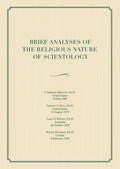SAMUEL S. HILL, PH. D
Dr. Hill wrote in 1979:
I am a professional scholar in the field of religious movements in the United States of America, as evidenced in the following ways:
- I hold a Ph.D. degree in religion from Duke University;
- I have been a professor of religion for 20 years, with one year at Stetson University, 12 at the University of North Carolina at Chapel Hill and at the University of Florida since 1972;
- I have published three books and numerous articles on the subject;
- I teach regularly in this area.
Within the past year and a half I have made something of a specialty of studying the Church of Scientology and consider that I am professionally competent to assess its character and nature.
Two judgments pervade all my assessments of it. The first is that it is a new, young, premature religious organization which must be looked at as still emerging, still developing, still finding its way – characteristics which hold true for all new religions. The second is that it has much more in common with such Eastern religions as Hinduism and Buddhism than it does with the two western biblical faiths, Christianity and Judaism. It is essential that Scientology be judged by its own standards, which are closer to Oriental than to Western ones, rather than through the imposition of western categories. Whether it fits western values, claims and assumptions is irrelevant to whether it is a religion or not.
I conclude that Scientology measures up to the definition of religions, in that it, like them all, has the four standard components:
- Creed. It teaches the vital existence of an ultimately spiritual dimension of reality.
- Code. It lives with a strong ethical sense, highlighting values and discriminating between good and bad, right and wrong.
- Cult. (In the sense of a worshipping group.) It seeks systematically to relate people to the spiritual dimension of reality, to Ultimate Reality, the Supreme Being, or God.
- Community. It has a clear sense of group identity and is an organized religious community.
These four components are typically regarded as constituting a religious movement anywhere.
Accordingly, it is a bona fide religion, with its own beliefs and practices. Basically, Scientology is a theory of knowledge or a way of understanding by which parishioners know what the Supreme Being is and how to participate in it for the improvement of personal and social health. Through this kind of knowing or understanding or worship, the person realizes himself or herself, achieves self-awareness and is in healing relationship with God. In this process of arriving at true spiritual freedom, one's life is cleared of barriers and obstacles to that freedom and made whole and happy as intended. In this respect it is quite like Hinduism and Buddhism.
Scientology acknowledges the reality of Ultimate Reality or God. "God" is less a personal “Supreme Being” here than an “Ultimate Reality”, the way things ultimately and most purely are, hence the route to the fullness of life intended for and
available to all people.
Scientology acknowledges the reality of Ultimate Reality or God. "God" is less a personal “Supreme Being” here than an “Ultimate Reality”, the way things ultimately and most purely are, hence the route to the fullness of life intended for and available to all people. Through the employment of revelation which often takes the form of techniques, people may achieve relatedness to and participation in the Supreme Being. In these respects, Scientology is more Eastern than Western, and more Buddhism than Hinduism. It aims for enlightenment through relatedness to the ways things really, ultimately are.
The principal mode of religious experience and worship is pastoral counselling. This consists of the application of Scientology by a minister of the Church to a parishioner. This is the principal means by which the person is enlightened, is related to the Supreme Being. There are public services; however they are less basic in Scientology's understanding than is pastoral counselling. In this counselling the actual relating to God occurs.
Scientology as a religion does not insist on religious monism; for example, one is permitted to practice both Scientology and something else, say Roman Catholicism. Here too it falls more into an eastern style, in tolerating a pluralism of loyalties and involvements. In actual practice, however, only a few Scientologists also practice another religion. Scientology has evolved from “Dianetics”, the theory and technique for realizing a wholesome life, to a church, during the past 29 years. My speculation is that, as the evolution further ripens, there is apt to be less encouragement to hold on to two faiths, and still less exercising of that option. In other words, I see it as a religion becoming increasingly more conscious of itself as a religion.
The term “an applied religious philosophy” describes Scientology rather well - but only if the term is freed from a dominating western religious framework. What the term means, on the positive side is:
- Scientology is religious, because it provides knowledge and means for being related to the Supreme Being;
- It stresses results (hence: “applied”) such as greater self-insight, understanding, health and happiness.
On the other side, by using “philosophy” it points to an outlook, a perspective, rather than an elaborated theology about a personal God based on historical events (as is the case with the biblical faiths).
By all known American standards, legal, practical, and religious, I judge the Church of Scientology to be what its name denotes, a true religious organization.
Samuel S. Hill
August 12, 1979
At the time he wrote this, Dr. Hill was Professor of Religion at the University of Florida.





























